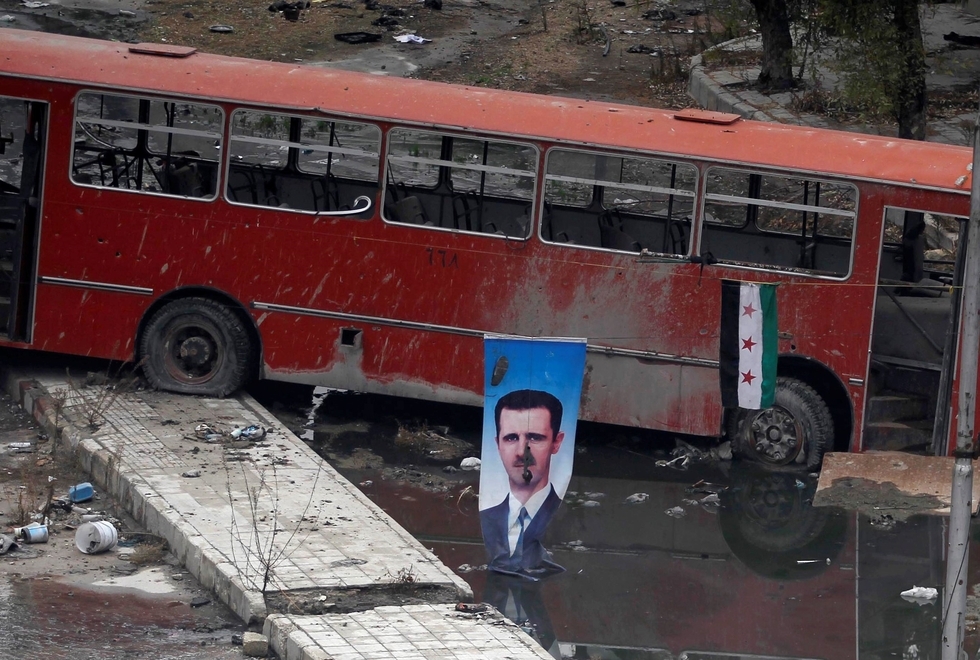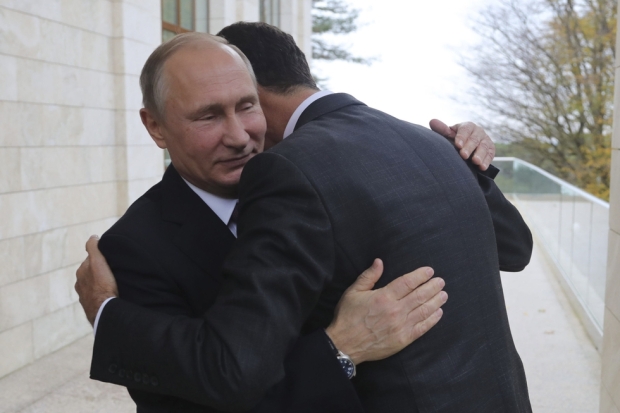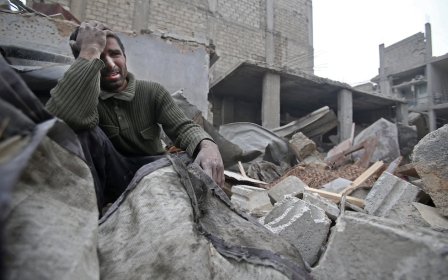Accepting Assad's rule won't end Syrians' suffering

The ongoing assault on Eastern Ghouta by the Syrian government and its allies brings back memories from my last few weeks in my hometown, Qusair. Few things have changed since then, except for the growing chorus of voices calling for Syrian President Bashar al-Assad to remain in power as a means of bringing peace to Syria.
These calls have increased dramatically in the past few months, following consistent military gains by government forces. For many, the outcome of the war is already decided. "The end game is clear: Assad, Russia and Iran will emerge victorious," writes Danny Makki on Open Democracy.
"The way to save lives, I've sadly concluded, is to let Assad win as quickly as possible," argues Max Boot in the Washington Post. Calls to accept Assad's rule generally rely on three main premises. Here is why these arguments do not hold water.
Realities on the ground
Many argue that President Assad has effectively won the war, and that it is high time to accept that reality. While many rebel groups have disappeared and others emerged, the Syrian regime has remained coherent, strong and tenacious, especially following Russian military intervention in 2015.
The fact that Assad has won militarily is not surprising. With strategic support from Russia and Iran, the Syrian government's strategy focused on achieving consistent, yet relatively small-scale, gains over the past seven years.
These include the recapture of Baba Amr, Qusair, Yabroud, Old Homs suburbs, Aleppo City, and Deir Ezzor between 2012 and 2017. Eastern Ghouta is the current target in the Assad regime’s offensive that has claimed more than 1,000 lives since 18 February.
There are no easy answers in Syria. The one certainty is that no stable resolution is possible under Assad
It is true that Assad's military gains are a reality on the ground. But does that mean that the international community should accept its rule based on military might? Has Syria turned into another example of the survival of the fittest, whereby only the strongest, most savage wins?
For some, the answer is probably yes, since military strength is the main determining factor in resolving conflicts. Yet: would the same analysts hail Hitler and accept his relentless military campaign in Europe? Acknowledging the military strength of Assad is understandable but using that to accept the status quo should not be normalised.
No better alternative
The second justification for accepting Assad's rule is the lack of a better alternative. The opposition is often claimed to be both fragmented and extremist. While some of these claims hold true, three points are missing.
First, these analyses often overlook the causes of the Syrian opposition's fragmentation, particularly the role of foreign actors' meddling. Unlike the Assad regime, the disparate opposition bodies were disadvantaged from the start, as they had to unify their ranks and build relations with external actors for support.
Third, the political and armed Syrian opposition are not the same as average non-fighting Syrians, who constitute most of the casualties of the Syrian government shelling.
To end suffering
The third most cited reason is that accepting Assad's rule is the only way to end Syrian suffering. While aware of its barbarity, some see re-engaging with the regime as a way to ease civilian suffering.
While these concerns are understandable, one might ask whether or not such approach guarantees that Assad will not retaliate against anti-government communities. Many in opposition-held areas have family members, relatives and friends who have fought against the government.
Several reports have shown that government forces have arrested civilians after seizing control of new areas. If Assad manages to quell resistance, his top priority will no doubt be to ensure that it never happens again.
Letting Assad win is likely to stop the shelling of civilian areas, since his forces will control the areas they used to shell. However, other forms of violence are likely to prevail. We can expect mass arrest campaigns, forced disappearances and torture.
The fate of hundreds of thousands of Syrians remains unknown. Because these forms of violence are likely to remain unreported and unseen, one might assume that the war is over. In reality, rather than saving lives, accepting Assad's rule will result in more unreported deaths as oppression will ensure that the cycle of violence continues.
Furthermore, the refugee crisis cannot be resolved while Assad remains in power.
There are no easy answers in Syria. The one certainty is that no stable resolution is possible under Assad. Restored to power, Assad will perpetuate the very conditions that first paved the way for foreign meddling, violence, and suffering.
His security apparatus will continue to unleash horrors against vulnerable communities. The only difference is that it will be done in utter silence, in Assad's prison cells.
- Rifaie Tammas is a Syrian activist and PhD candidate at Macquarie University in Sydney, Australia where he also teaches several units. His research interests include foreign intervention, collective violence, and internal conflicts. He worked as a citizen journalist between 2012 and 2013 reporting on the conflict from Syria.
The views expressed in this article belong to the author and do not necessarily reflect the editorial policy of Middle East Eye.
Photo: A picture of Syrian President Bashar al-Assad is seen near a Syrianopposition flag in Aleppo's Bustan al-Basha district, in Syria on 3 December, 2013 (REUTERS).
This article is available in French on Middle East Eye French edition.
Middle East Eye propose une couverture et une analyse indépendantes et incomparables du Moyen-Orient, de l’Afrique du Nord et d’autres régions du monde. Pour en savoir plus sur la reprise de ce contenu et les frais qui s’appliquent, veuillez remplir ce formulaire [en anglais]. Pour en savoir plus sur MEE, cliquez ici [en anglais].






